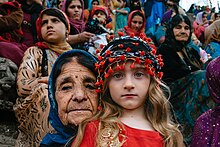Traditional clothing of the Kurdish people
Kurdish traditional clothing (Kurdish: Cilî kurdî, Cil û bergî kurdî or Cil û bergên kurdî) is a historical and contemporary aspect of Kurdish heritage.
 |
Kurdish traditional clothing (Kurdish: Cilî kurdî, Cil û bergî kurdî or Cil û bergên kurdî) is a historical and contemporary aspect of Kurdish heritage.



Kurdish men wear their traditional dress routinely, not only on special occasions. They wear leather boots and sometimes sandals.[2] In the past, Kurdish costume was worn on many days. Currently some women still wear it on a daily basis, especially those of older generations. Everyday attire tends to be modest in colour, with little or no accessories or embroideries. In the present day, Kurdish dress is more commonly worn on special occasions.
The traditional Kurdish women's outfit includes either a vest or long-sleeved jacket or a long overcoat worn over a gown. An underdress and puffy pants are worn beneath the gown. A belt over the gown is also needed. Traditionally, women wore Kurdish hats ornamented with valuable coloured stones, beads and gold pieces. This has become less common over time. Now it is more popular among women to accessorise solely with gold jewellery.
Usually, younger women and girls wear brightly coloured dresses adorned with several beads and sequins, while older women wear darker colours. However, older women tend to wear more gold jewellery because traditionally when women married they would receive a dowry of gold jewellery pieces from their groom.


Modern Kurdish women's dress is traditional. It is, however, still fashionable amongst the Kurdish community. Kurdish women and men often have a large collection of Kurdish clothing and frequently seek out new designs and fabric. They usually buy the fabrics of their choice and then have clothing tailored, as there are tailors who specialise in Kurdish clothes. Recently these respected tailors have turned into designers, creating variations on the conventional structure of the dress. In villages, women usually tailor for their entire family after everyone chooses their fabric.
There are many different styles of the Kurdish clothes, and in recent years there have been several fashion shows, showcased for a Kurdish and international audience. Shows have been held in Vancouver, Canada;[6] in Melbourne, Australia, at the Kurdish Film Festival by the Kurdish Women's Society;[7] and at the Hackney Museum as part of their Kurdish Cultural Heritage Project.[8]


